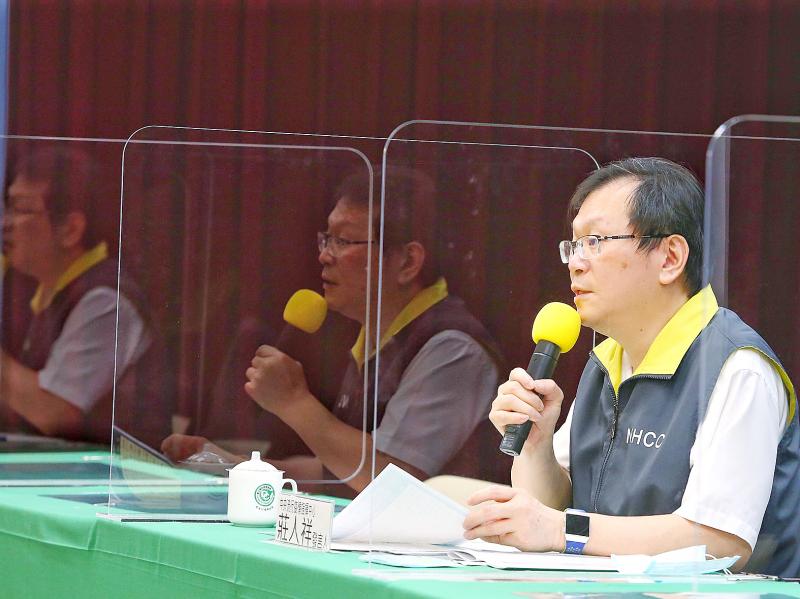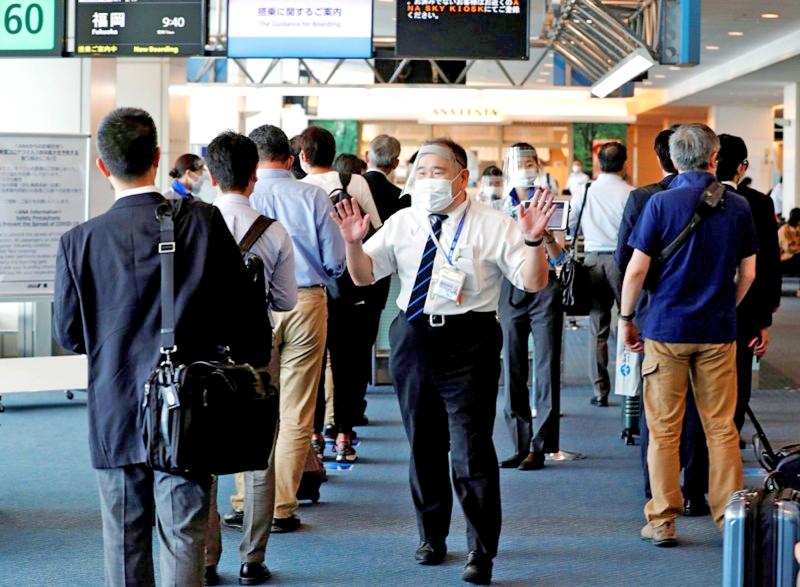Taipei and Tokyo have agreed to grant entry to each other’s business travelers, marking Taiwan’s first air corridor with another nation amid the COVID-19 pandemic, the Ministry of Foreign Affairs said yesterday.
Taiwan on June 22 started allowing business travelers from designated nations to enter under certain conditions, including providing a negative polymerase chain reaction (PCR) test result obtained within three days of boarding their flight.
The government at the time listed Japan as a medium-risk country, meaning people arriving from Japan could apply for a shorter quarantine period.

Photo: CNA
Since Japan was removed from the list on Aug. 5 when its COVID-19 cases spiked, arrivals from Japan have been required to undergo 14 days of isolation, Centers for Disease Control Deputy Director-General Chuang Jen-hsiang (莊人祥) said.
The Japanese government yesterday agreed to reopen its borders to business travelers from Taiwan, after bilateral negotiations started on July 22, the ministry said, referring the public to the Japan-Taiwan Exchange Association’s Web site for details.
Japan’s new policy is to take effect from Tuesday next week, when it would start a “residence track” for business travelers from Taiwan, the association announced on its Web site.

Photo: Reuters
To apply for a visa, Taiwanese businesspeople need to present a job employment certificate or work invitation to the association, the ministry said.
They would need a negative PCR test result obtained within three days of boarding their flight and would be required to take another test upon arriving in Japan, where they would also undergo 14 days of isolation at home or a designated facility, it added.
As strong partners and close friends, Taiwan and Japan have supported each other in the wake of many natural disasters, and collaborated to evacuate citizens stranded in other countries due to COVID-19 travel restrictions, it said.
The two nations hope to continue to boost economic ties and work together to combat the pandemic, it said.
Japan’s new policy also applies to travelers from Cambodia, Laos, Malaysia and Myanmar, after it first eased restrictions for those from Thailand and Vietnam, Kyodo News reported yesterday.
Japan denies entry to foreign nationals who have recently been to any of 159 countries and regions, including the US, China and all of Europe, it reported.

MISINFORMATION: The generated content tends to adopt China’s official stance, such as ‘Taiwan is currently governed by the Chinese central government,’ the NSB said Five China-developed artificial intelligence (AI) language models exhibit cybersecurity risks and content biases, an inspection conducted by the National Security Bureau (NSB) showed. The five AI tools are: DeepSeek, Doubao (豆包), Yiyan (文心一言), Tongyi (通義千問) and Yuanbao (騰訊元寶), the bureau said, advising people to remain vigilant to protect personal data privacy and corporate business secrets. The NSB said it, in accordance with the National Intelligence Services Act (國家情報工作法), has reviewed international cybersecurity reports and intelligence, and coordinated with the Ministry of Justice Investigation Bureau and the National Police Agency’s Criminal Investigation Bureau to conduct an inspection of China-made AI language

BOOST IN CONFIDENCE: The sale sends a clear message of support for Taiwan and dispels rumors that US President Donald Trump ‘sold out’ the nation, an expert said The US government on Thursday announced a possible sale to Taiwan of fighter jet parts, which was estimated to cost about US$330 million, in a move that an expert said “sends a clear message of support for Taiwan” amid fears that Washington might be wavering in its attitude toward Taipei. It was the first announcement of an arms sale to Taiwan since US President Donald Trump returned to the White House earlier this year. The proposed package includes non-standard components, spare and repair parts, consumables and accessories, as well repair and return support for the F-16, C-130 and Indigenous Defense Fighter aircraft,

CHECKING BOUNDARIES: China wants to disrupt solidarity among democracies and test their red lines, but it is instead pushing nations to become more united, an expert said The US Department of State on Friday expressed deep concern over a Chinese public security agency’s investigation into Legislator Puma Shen (沈伯洋) for “secession.” “China’s actions threaten free speech and erode norms that have underpinned the cross-strait ‘status quo’ for decades,” a US Department of State spokesperson said. The Chongqing Municipal Public Security Bureau late last month listed Shen as “wanted” and launched an investigation into alleged “secession-related” criminal activities, including his founding of the Kuma Academy, a civil defense organization that prepares people for an invasion by China. The spokesperson said that the US was “deeply concerned” about the bureau investigating Shen

‘TROUBLEMAKER’: Most countries believe that it is China — rather than Taiwan — that is undermining regional peace and stability with its coercive tactics, the president said China should restrain itself and refrain from being a troublemaker that sabotages peace and stability in the Indo-Pacific region, President William Lai (賴清德) said yesterday. Lai made the remarks after China Coast Guard vessels sailed into disputed waters off the Senkaku Islands — known as the Diaoyutai Islands (釣魚台) in Taiwan — following a remark Japanese Prime Minister Sanae Takaichi made regarding Taiwan. Takaichi during a parliamentary session on Nov. 7 said that a “Taiwan contingency” involving a Chinese naval blockade could qualify as a “survival-threatening situation” for Japan, and trigger Tokyo’s deployment of its military for defense. Asked about the escalating tensions